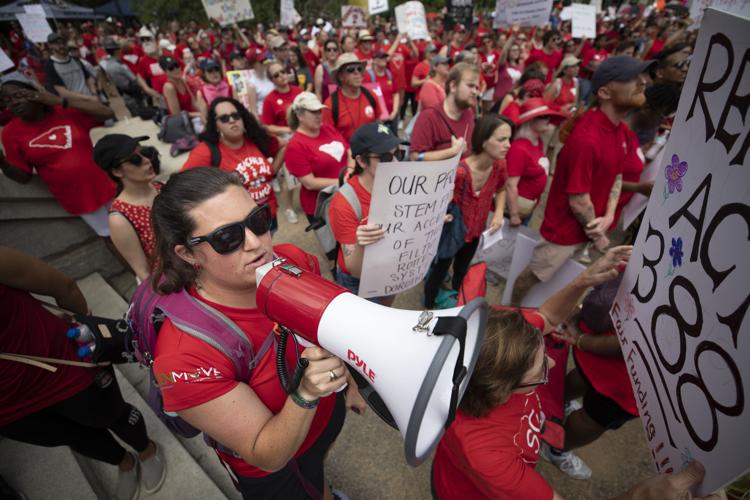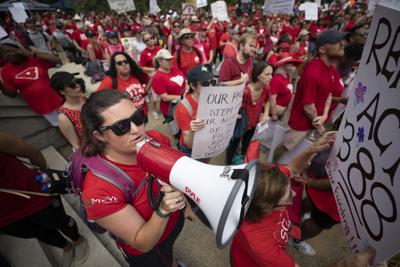In a single year, a Facebook group for frustrated teachers grew into one of the largest labor actions in South Carolina history, briefly transcending 40-year-old divisions among teacher activists and putting top Republican power brokers on the defensive.
The sea of red-clad marchers flooding the Statehouse lawn at the May 1 protest in Columbia caught Saani Perry by surprise — and he had been at the center of the movement since its early days.
Early Wednesday morning, organizers counted 6,672 RSVPs for the #AllOutMay1 event. By mid-morning, the Department of Public Safety estimated 10,000 people were in attendance.
"It was life-changing to me," said Perry, a teacher at Springfield Middle in Fort Mill. "I feel so rejuvenated."
The protest, which forced seven school districts to shut down for the day, was unprecedented in South Carolina history but modest by the standards of recent teacher labor movements in other states.
In Arizona, where teacher strikes are illegal, they walked out for six days in 2018 and won a 20 percent raise by 2020.
The project, Minimally Adequate, is the result of an eight-month investigation into South Carolina's troubled education system, which ranks among the nation's worst.
In Oklahoma, teachers walked out for nine school days and won a 13 percent pay raise. Making good on a promise, they also ousted dozens of billionaire-backed incumbents in GOP primaries last year.
South Carolina teachers are likely to see a minimum 4 percent raise next year. The Legislature plans to give newer teachers with fewer than five years of experience as much as a 10 percent pay hike in an effort to stanch the bleeding of young talent.
The draft budget for the 2019-20 fiscal year would raise the state minimum pay to $35,000, almost catching up with inflation for the first time since Republicans took control of the House, Senate and governor's office in 2003. It would not restore base student funding to the minimum levels set in state law in 1977. No taxes were raised. South Carolina will still likely have the seventh-lowest effective real estate tax in the country.
It remains to be seen what victories, if any, South Carolina teachers will wrest out of the next legislative session. Top Republican lawmakers intoned the group's confrontational tactics could "backfire" in the halls of the Statehouse, where teacher advocacies have traditionally made polite requests for moderate concessions.
House Education and Public Works Chair Rita Allison, whose face featured prominently on several protest signs Wednesday, said the House is already committed to improving South Carolina's education system, which recently fell behind Mississippi's in early literacy rankings.
“This reinforces things we’re already doing," Allison said of the protest. "And it makes them feel better.”
The state budget for next year, which has not been finalized, includes $2.2 million to hire additional mental health counselors, $10 million for school resource officers, $19 million for new school buses, and $50 million to $65 million for building repairs in poor school districts.

Thousands rallied at South Carolina’s Statehouse to protest, march and speak for improved working conditions for teachers. Columbia Police Department/Provided
New tactics
The teachers who stormed the state capital Wednesday openly mocked top-ranking lawmakers and Education Superintendent Molly Spearman. "Where's Molly?" was a common rallying cry. Spearman came in for several rounds of criticism after she condemned the teacher protest and spent the day filling in as a substitute music teacher at an affluent Lexington County elementary school.
One sign offered an election prophecy in a Game of Thrones font: "November is coming."

Matt Gregory, a special education teacher from Greenville County, holds up a protest sign May 1 at the Statehouse featuring the faces of U.S. Education Secretary Betsy Devos, Gov. Henry McMaster, and S.C. Education Superintendent Molly Spearman. Paul Bowers/Staff
Teachers held up picket signs bearing the images of Spearman, Allison, Gov. Henry McMaster and Senate Education Chair Greg Hembree.
They chanted: "Do your job." "Time's up." "We teach. We vote."
Though the roar of the crowd was audible from the governor's office, McMaster stayed indoors, as did most lawmakers. A few stepped out to look at the throng, then walked back in.
Matt Gregory, a special education teacher from a high-poverty school in Greenville County, held a poster bearing the faces of McMaster, Spearman and U.S. Education Secretary Betsy DeVos under the slogan "This is why we can't have nice things." Like many teachers at the rally, Gregory said he was fighting for more mental health counselors for his students, and for caps on classroom sizes that have grown since the Great Recession.
Gregory, who identifies as an independent voter, said he voted for Spearman in 2018 when she ran unopposed as a Republican. He said he won't be voting for her again.
Catharsis
On Thursday afternoon, after uploading her AP students' scores to the College Board, Ridgeview High School teacher Nicole Walker checked her Facebook account.
There were 664 posts and 561 member requests pending her approval. Laughing through a sigh, she resumed the task of moderating SC for Ed, a sometimes-rowdy Facebook group with 27,000 members and counting.
Walker and Lisa Ellis, a Blythewood High School journalism teacher, launched the group in May 2018 with a handful of colleagues and little appetite for activism.
"We actually thought it was going to be more cathartic than anything ... just to sort of have some morale amongst friends," Walker said. "We didn't think it was anything more than us being able to take comfort in each other and share some ideas."
Friends invited friends, and the group grew exponentially.
South Carolina teachers do not make enough money to pay rent, pay off student debt, buy a house, or raise a family. Here are the stories of five teachers working second jobs (and in some cases third jobs) just to make ends meet.
In 2019, the teachers decided to leap into the legislative fray. Incensed by the lack of input in an original draft of an omnibus education bill, they packed subcommittee hearings and carpooled to Senate-hosted public input sessions. Again and again, they thanked Hembree for hearing them out.
Teachers repeatedly called on lawmakers to revise or repeal Act 388, a 2006 tax cut that eliminated homeowner-occupied property tax as a funding stream for public schools.
The state's system for funding schools, which the S.C. Supreme Court found to be fundamentally inequitable in a landmark 2014 decision, remains untouched, leaving high-poverty and rural districts at a continuing disadvantage.
Rather than hash out the education bill in April, the Legislature postponed the debate on education overhaul until next year.

Camille Stack, a music teacher in Richland County joints a teacher protest outside of the SC Statehouse in Columbia on Wednesday, May 1, 2019. Lauren Petracca/Staff
A divided labor force
Nearly every stronghold of labor power in South Carolina has been gutted by a half-century of anti-union laws, court rulings, attorney general opinions and public denunciations by elected officials.
When workers at a Boeing assembly plant in North Charleston sought to unionize in 2015, then-Gov. Nikki Haley recorded union-busting radio ads for the company. After serving a stint at the United Nations, Haley now sits on the board at Boeing.
South Carolina's county-level education associations and the S.C. Education Association, once a formidable political force, have been decimated since their heyday in the 1970s, both by public policy decisions and internal fights that split the teachers' base. The SCEA was the third-weakest state affiliate of the National Education Association labor union in the United States, according to a 2012 analysis by the conservative Thomas B. Fordham Institute.
Sherry East, president of SCEA, said she saw a small surge of membership interest in the past week. But her group is still dwarfed by the membership rolls of the Palmetto State Teachers Association, which formed in 1976 as an explicitly anti-union teacher organization, charges less for membership, and offers liability insurance to its members.
SC for Ed's board includes members who have done stints as card-carrying members of both SCEA and PSTA. SC for Ed has sidestepped the union question entirely.
"We're not interested in unionization. Our goal is advocacy. Teachers just lack a voice in South Carolina," Walker said.
Walker says teachers from her group reached out to SCEA and PSTA asking if they would like to help organize the May 1 event, but both organizations declined.
SC for Ed has not registered as a nonprofit organization and collects no dues from members. It hasn't even purchased a domain name for its website. The group has no paid staff and little money in reserve, according to Walker.
The group has funded its efforts by selling T-shirts and hosting small-dollar online fundraisers. Walker says the final cost of the rally at the Statehouse was about $3,200, including tents, audio system rental, and a row of 15 portable toilets on Sumter Street.
Intimidation
In the week leading up to May 1, principals and administrators were pressuring teachers, in public and in private, to stay out of Columbia.
A handful of teachers from Greenville County, South Carolina's largest school district, said colleagues were intimidated by district leaders. On April 29, Superintendent Burke Royster emailed all staff urging them to instead participate in an effort he called "#ReachOutMay1," in which teachers would call or email their legislators after school hours.
"Please consider first thanking them for their efforts to reform education and then letting them know your biggest priorities," Royster wrote.
House Speaker Jay Lucas told The State newspaper that "outside groups" were feeding the teachers misinformation, but declined to say which groups.
Online commentators made note of the rally's timing on International Workers' Day, a labor holiday celebrated by dozens of democratic countries worldwide.
"May Day? Really? Are we thinking of the State House grounds as Red Square?" opined Brad Warthen, a former editor at The State who worked as a spokesman for Democrat James Smith's failed gubernatorial campaign in 2018.
As for the choice of date for the first protest action, Walker said her group chose it to stand in solidarity with North Carolina teachers, who were marching on their Statehouse the same day. She said she hadn't heard of May Day or its socialist connotations before critics brought it up online.
According to Walker, SC for Ed could return to the Statehouse lawn in June if McMaster convinces the legislature to return for an extended legislative session. If not then, they could return in January 2020. She anticipates a larger crowd next time.
South Carolina's average teacher salary ranks 40th in the nation, fueling a crisis-level teacher shortage that grows every year. The state has not enforced classroom size caps since 2010, citing austerity measures that date back to the Great Recession. School buses remain on the road that are older than students' parents. Rural students still attend schools where the roofs leak every time it rains.
Regrouping after a watershed week, the statewide network of teachers has not settled on its next course of action. Leaving school after a day's work Thursday, Walker could only make one guarantee: They'll be back.
Seanna Adcox contributed to this report.



















